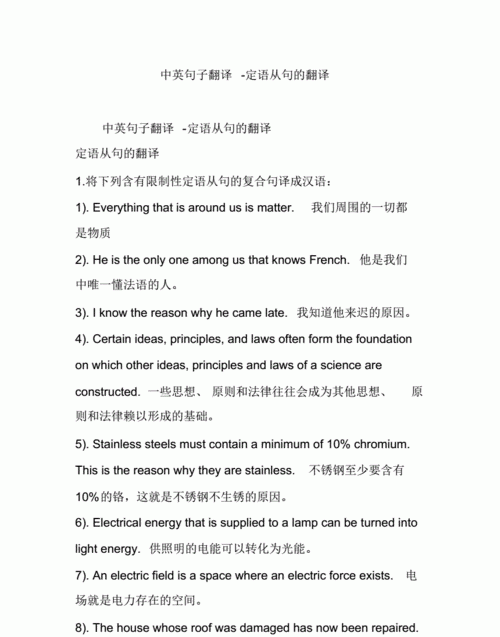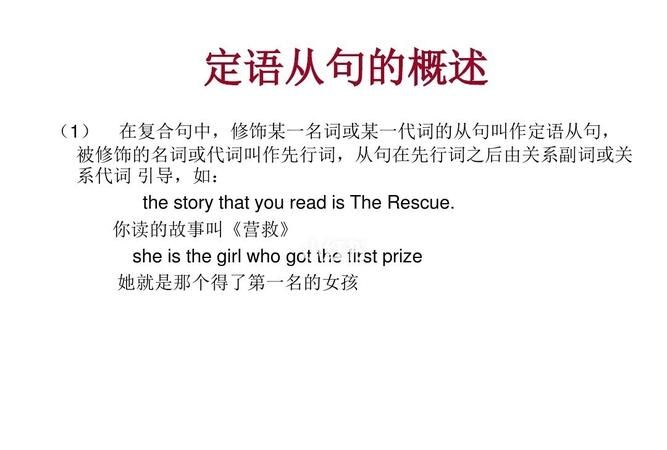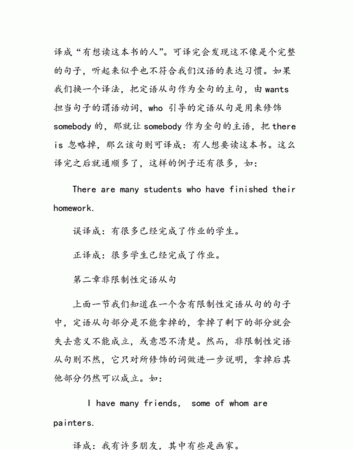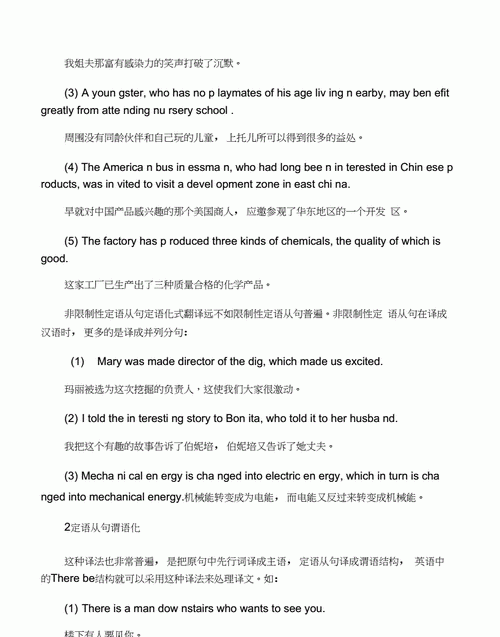本文目录
定语从句的翻译句子关于生活
定语从句是英语学习的难点,也是考研英语考查的重点。下面一起来看看定语从句的翻译句子吧!
一、前置译法
如果一个定语从句在句中的作用是修饰和限定名词,那么通常就采取译为前置定语的方法。但注意译成前置定语后既不能影响原文所表达的意思,还要使整个句子的表达言简意赅、连贯通顺、语气较强。
例句:Water, which is a clear liquid, has many uses.
译文:水是一种清澈的液体,有许多用途。
在前置译法的过程中如果定语从句中的谓语不含有具体意义,可省译从句中的谓语。这种译法很简便,也很有效。
有时候,出于汉语行文的需要和逻辑关系方面的考虑,可将定语从句提在主语之前翻译,用来说明情况,但不作为被修饰名词的定语。
例句:There are also great advantages that come from the variety of culture brought by settlers from other lands.
译文:移民从个地方带来了多种文化,产生了极大的好处。
二、后置译法
我们都知道,英语中很多定语从句都是为了连接两个具有共同名词的句子而存在的,因此在翻译时最好分为两个分句。而对于起限定作用的定语从句,如果结构较为复杂,句子太长,无法译成前置的定语,最后就译成一个后置的并列分句,这样更合乎汉语的习惯。
例句:Our war against terror is a contest of will in which perseverance is power.
译文:我们的反恐战争是一场意志力的较量。在这场较量中,不屈不挠的精神就是力量。
结构较复杂的定语从句常译成后置的并列分句,在多数情况下要重译先行词,或即便句子不长,出于某种原因需要强调先行词,也要重译先行词。
例句:Days and nights are very long on the moon, where one day is as long as two weeks on the earth.
译文:在月亮上,白天和黑夜都相当长,月亮上的一天等于地球上的两周。
有些定语从句翻译时译成后置分句,但可不重译先行词,任符合汉语习惯。
例句:Both picnics and BBQ are friendly, informal social events that offer an opportunity to enjoy a meal outside in pleasant surroundings.
译文:野餐和烧烤都是友情洋溢、不拘礼节的`社交活动,可以让大家在户外的一个怡情的环境里高高兴兴地美餐一顿。
三、转换译法
有的定语从语法结构上是定语,其定语的作用,从意义上说又相当于一个状语从句,所以常常被称为状语化的定语从句,说明时间、原因、条件、结果、目的、让步、假设等关系。其中表示因果关系的是考研阶段最为重要的知识点。
例句:I’m not speaking of the few thousand astronomers, geographers and so forth who could give, or have a theoretical knowledge of that proof, but of the ordinary newspaper-reading citizens, such as you or we.
译文:我说的不是数千位天文学家、地理学家之类的人,因为他们可以用观察到的事实或用理论上的依据来证实这点,我指的是如同你我一样只会看报纸的普通读者。

关于英语定语从句的翻译方法的研究背景应该怎么写
1.我不喜欢他昨天给我讲的那个故事 I don't like the story he told me yesterday.
2.我不想与那种只考虑自己的人交朋友 I don't want to make friends with people who only consider themselves.
3.你认识那个与我的老师谈话的那个人么?Do you know the guy who talked to my teacher?
4.他居住在一栋墙是黄色的房子里 He is living in a house whose walls are yellow.
5.你记得你出生的那一年吗?Do you remember the year you was born?
6.我们将去参观他叔叔工作的那个工厂 We will call on the factory where his uncle works.
7.我仍然记得在你们学校看到的学生们和漂亮的教学楼 I still remember the students and a beautiful education building you saw when you were at your school.
8.你们必须记住老师教你们的一切 You all should remember what the teacher taught you.
9.你认识那位穿红衣服的靓妹吗?Do you know the lass who is in red dress?
10.在这次考试中失败的学生们必须尽力赶上其他人 The students who failed on this examination should catch up with others.

定语从句句子翻译
Actions speak louder than words.
行动比言语更有说服力。(事实胜于雄辩。)
(2)Better late than never.
迟做总比不做好。
(3)Honesty is the best policy.
诚实总是上策。
(4)The best fish are / swim near the bottom.
好鱼居水底。(有价值的东西不能轻易得到。)
(5)The more you get, the more you want.
拥有越多想要越多。
(注:以上五句谚语运用了形容词、副词比较级、最高级。)
(6)A rising tide lifts all boats.
水涨众船高。
(7)Time lost cannot be recalled. (recall vt. 召回,恢复)
光阴一去不复返。
(8)To stand still is to move back.
逆水行舟,不进则退。
(9)Saving is getting.
节约而后有。(节约就是获得。)
(10)It is no use crying over spilt milk.
覆水难收。(打翻牛奶,哭也没用)
(注:以上五句运用了非谓语动词。)
(11)All work and no play makes Jack a dull boy.
只工作(学习)不玩耍,聪明孩子也变傻。
(12)Early to bed and early to rise makes a man healthy, wealthy, and wise. 早起早睡使你健康、富裕、聪明。
(13)An apple a day keeps the doctor away.
多吃水果利健康。(一天一苹果医生远离我。)
(14)Absence makes the heart grow fonder. 久别情深。
(15)Money makes the mare go. (mare n. 母马,母驴)
有钱能使鬼推磨。
(16)You may take a horse to the water, but you cannot make him drink. 领马河边易,逼马饮水难。
(不要逼人做不愿做的事。)
(注:以上六句运用了“vt. + 宾语+ 宾语补足语”。)
(17)A bird in the hand is worth two in the bush.
双鸟在林不如一鸟在手。
(18)An hour in the morning is worth two in the evening.
一日之计在于晨。
(19)Hope for the best and prepare for the worst.
抱最好的希望,作最坏的准备。
(20)It’s never too late to mend.
改过迁善从不嫌晚。(亡羊补牢,未为迟也。)
(21)One is never too old to learn. 活到老,学到老。
(22)Reading is to the mind what exercise is to the body.
阅读对于我们心灵之重要,犹如运动对于身体一样。
(注:以上六句运用了be worth…, hope for…, prepare for…, too… to…, A is to B what C is to D 固定结构)
(23)All that glitters is not gold. / All is not gold that glitters. (glitter vi. 闪光,闪烁)闪光的并非都是金子。
(24)All that dogs bark at are not thieves. / All are not thieves that dogs bark at.狗吠者未必是贼。(勿以貌取人。)
(25)Every couple is not a pair. / Not every couple is a pair. 成双未必能配对。
注:以上三句运用了部分否定结构。)
(26)It is a good horse that never stumbles, and a good wife that never grumbles. (stumble vi. 绊倒,失足 grumble vi. 发牢骚,抱怨)良马会失蹄,贤妻有牢骚。
(27)It’s a long lane that has no turning. (lane n. 小巷) 否极泰来。(路必有弯,事必有变。)(没有弯曲的路真长。)(不顺是暂时,转机定出现。)
(28)It is love that makes the world go round.
爱使世界更美好。
(29)It is the early bird that catches the worm.
早出的鸟儿吃到虫。(疾足者先得。)
(注:以上四句运用了强调句型。)
(30)A fall into the pit, a gain in your wit. (pit n. 坑,陷井 wit n. 智力,才智)
吃一堑,长一智。
(31)An eye for an eye, a tooth for a tooth.
以眼还眼,以牙还牙。
(32)Never put off till tomorrow.
今日事,今日做。(今日事,今日毕。)
(33)Once bitten, twice shy.
一朝被蛇咬,十年怕井绳。(一次上当,下次小心。)
(34)Out of sight, out of mind.
眼不见,心不想。(不见就忘。)(离久情疏。)
(35)Waste not, want not. 不浪费,不愁缺。
(注:以上六句运用了“省略”,表达精练,语言生动。)
(36)All’s well that ends well. 结果好就是一切好。
(37)He laughs best who laughs last.
谁笑在最后,谁笑得最好。
(38)Those who live in glass houses should not throw stones.
家居玻璃房,切忌乱扔石。(自己有弱点,勿揭他人短。)
(注:以上三句运用了定语从句。)
(39)Don’t count your chickens before they are hatched. (hatch vt. 孵出) 小鸡孵出前,先别忙点数。(办事尚未果,不把成功言。)(不要过早乐观。)
(40)When in Rome do as the Romans do.
身处罗马学意人,到了一地尊风俗。(入乡随俗)
(41)What’s learnt in the cradle lasts till the tomb. (cradle n. 摇蓝)
摇蓝中所学,受用到墓穴。(孩提时代学到的东西,至死不忘。)
(注:以上三句分别运用了时间状语从句、方式状语从句、主语从句。)
(42)If at first you don’t succeed, try, try, try again. 再接再厉,终会成功。
(43)If a thing is worth doing, it’s worth doing well. 凡值得一做的都值得做好。
(44)While there is life there is hope.
有生命就有希望。(留得青山在,不怕没柴烧。)
(注:以上三句运用了条件状语从句)
(45)Where there’s a will, there’s a way. 有志者事竟成。(日本丰田汽车公司曾把该谚语改为一句琅琅上口的广告:Where there’s a road, there’s a Toyota.)
(46)Where there’s smoke, there’s fire. 无风不起浪。
(注:以上两句运用了地点状语从句)
1.God helps those who help themselves.
自助者天助。
2.He who does not reach the Great Wall is not a true man.
不到长城非好汉。
3.He who laughs last laughs best.
谁笑到最后,谁笑得最好。
4.All is well that ends well.
结局好,一切都好。
5.All that glitters is not gold. All is not gold that glitters.
闪闪发光的不都是金子。
6.Nothing in the world is difficult for one who sets his mind to it.
世上无难事,只怕有心人。
Nothing is difficult to the man who will try.
世上无难事,只要肯登攀。
7.The hands that push cradles are the hands that push the world.
推动摇篮的手,就是推动世界的手。
8.He who knows others is learned, and he who knows himself is wise.
知人者智,自知者明。
9.He who loves others is constantly loved, and he who respects others is constantly respected.
爱人者人恒爱之,敬人者人恒敬之。
10.True friendship is like sound health, the value of which is seldom known until it is lost.
真正的友谊犹如健康的身体,失去时方知其可贵。
心急吃不了热豆腐。 All good things come to those who wait.
天外有天,人外有人。There is always somebody out there who is better than you
4.A good book is a best friend who never turns back upon us.好书如挚友,情谊永不变。
5.He gives twice who gives quickly.及时援助,事半功倍。
6.He who makes no mistakes makes nothing.谨小慎微,难成大器。
7.He is rich that has few wants.寡欲则富。
8.He who has a lazy hand has an empty mouth.手懒饿肚皮。
9.He who knows useful things,not many things,is wise.聪明的人不是懂得多,而是懂得有用的东西。
10.He who gains time gains all.赢得时间就赢得一切。

初中定语从句翻译题
英语中的定语从句起到了一个修饰的作用,作用相当于形容词,那么定语从句我们也称之为形容词性从句。下面是我为你带来的作文中定语从句翻译题 ,欢迎阅读。
定语从句的翻译方法主要有以下四种:
前置法:把定语从句的内容翻译成“……的”,放在被修饰词的前面。
后置法:把定语从句的翻译放在被修饰词之后,定语从句的后置翻译分为三类:由which引导定语从句时一般翻译为“这”;另一些引导词则在翻译时重复先行词,即被修饰词;还有一些引导词在翻译时可以省略不译。
融合法:将定语从句与主句融合为一个简单句的方法。这种用法往往用在“there be”结构带有定语从句的句型中。
状译法:如果主句和定语从句之间有明显逻辑关系,则翻译为状语。
【真题例句1】
Behaviorists suggest that the child who is raised in an environment where there are many stimuli which develop his or her capacity for appropriate responses will experience greater intellectual development.
【解析】
可以拆分为:Behaviorists suggest //that the child //who is raised //in an environment// where there are many stimuli //which develop his or her capacity //for appropriate responses //will experience greater intellectual development.
本句的'主干即是Behaviorists suggest that ...;that引导suggest的宾语从句,动词是will experience;who引导修饰child的定语从句,动词为is raised;where引导修饰environment的定语从句,动词为are;which引导修饰stimuli的定语从句,动词为develop。who引导的定语从句的翻译运用了“状译法”,翻译为“如果……那么……”;where引导的定语从句因比较短小而采取了前置法,放到了先行词environment的前面,翻译为“……的”;which引导的定语从句翻译为转折关系。
【参考译文】
行为主义者的看法是,如果一个儿童在有许多刺激物的环境里成长,而这些刺激物能够发展其做出适当反应的能力,那么,这个儿童将会有更高的智力发展。
【真题例句2】
The Greeks assumed that the structure of language had some connection with the process of thought, which took root in Europe long before people realized how diverse languages could be.
【解析】
可以拆分为:The Greeks assumed//thatthe structure of language hadsome connection// with the process of thought, //whichtookroot// in Europe //long beforepeoplerealized//howdiverse languagescould be.
本句的主干即是:The Greeks assumed。That引导assumed的宾语从句,动词为had;which引导定语从句修饰前面的整个宾语从句,即希腊人的观点,句中动词是took;在此定语从句中,long before引导时间状语从句,动词是realized;其中how引导realized的宾语从句,从句动词为could be。which引导的定语从句在翻译时重复先行词,即前面整句,译为“这一观点”。
【参考译文】
希腊人认为,语言结构与思维过程之间存在着某种联系。这一观点在人们尚未认识到语言的千差万别以前就早已在欧洲扎下了根。

以上就是关于定语从句短文翻译 ,定语从句的翻译句子关于生活的全部内容,以及定语从句短文翻译 的相关内容,希望能够帮到您。

